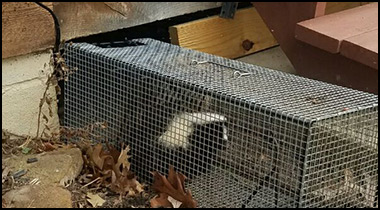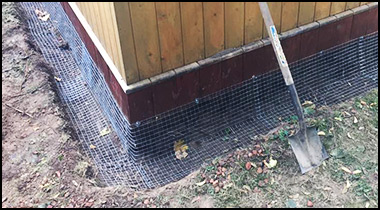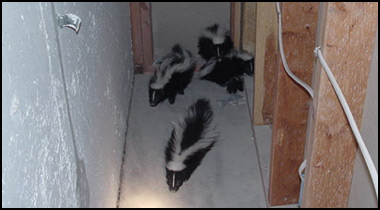Scranton Skunk Removal Resources
Skunk Rehabber - Pocono Wildlife Rehabilitation & Education Center: (570) 402-0223
Free Lackawanna County Animal Services: 570-348-4180 x7
Humane Wildlife Trappers of Scranton: 570-904-8590
If you need skunk control in Scranton, you have a few options. First, you can attempt to solve the skunk problem yourself by reading our do-it-yourself guide. If you need outside help, you can also call Lackawanna County Animal Services to see if they have any free resources or help for you - however, they primarily deal with dog and cat concerns. You can also call a local Scranton wildlife rehabber, as they are typically a great resource for advice that is in the best welfare of the animal. If as a last resort you must hire a professional company, we recommend Humane Wildlife Trappers of Scranton at 570-904-8590. To learn more about them or check their skunk removal prices, visit scrantonpestanimal.com.

Scranton Skunk Trapping and Removal

Preventative Repairs & Exclusion

Scranton Skunk Removal From Structures
In many cases, preventative measures can solve your Scranton skunk problem - keep garbage secured, pet food indoors, and most of all when it comes to skunks, secure the perimeter of your shed, porch, deck, or house with a barrier - lattice or steel mesh is good, and it keeps Pennsylvania skunks from going under the structure. If trapping and removal of the skunk is the only option you have, please do so with the help of a local agency or professional company who knows how to do it humanely and legally. Browse the resources of this site for more educational information.
Frequently Asked Questions:
Prevention: How to Keep Skunks Away
What to do with a skunk after I catch it?
Is it legal for me to trap a skunk?
How to remove skunk odor
Is a skunk active during the daytime rabid?
What does skunk feces look like?
Scranton Skunk Control Information: What is a skunk's mating habits, when do they have babies, how do they raise their young?
mating season for striped, hog-nosed, and hooded skunks is from early February through the month of March. During that time the area they inhabit may consistently have that "skunk smell"
There are several reasons for the stink. It happens when a male tries to breed females who are not "in the mood." If the male won't take "no' for an answer female skunks will spray an unattractive aroma to run off the unwanted males. It happens if two males decide to fight over a female. Later than a (gestation period) of about sixty days, the female skunk give birth to a litter of pups around April, May. Older female skunks come in season earlier than their younger counterparts, and so, have their litters a bit earlier. The Older females usually have larger litters too. Female skunks are able to breed as early as their second summer. typical skunk populations often have a large majority of pregnant or nursing females. A skunks Litters usually consist of between four and seven pups. Each male skunk can breed with several females each season. After mating, female skunks leave their winter den and move to a separate nursery den. A burrow lined with grasses is the makeup for a typical maternal den for bedding. If the female can find an abandoned den she is happy to move in that as well.
Young skunks are both blind and deaf at birth and have very short and fine fur. Adult males skunks do not care to participate in the rearing of their offspring. young are nursed and cared for in their den for about six weeks. After this they begin joining their mother on hunting and foraging trips outside the den. By this time they look like a miniature skunk. The baby skunks are completely weaned by about two months of age. The family unit separates in the early fall and the young skunks move on to their own territory. They will travel up to 10 miles in search of their new home
Remember, for free services you can try (570) 402-0223 or 570-348-4180 x7, but if you need to pay for professional help, check the prices at the scrantonpestanimal.com website. Or follow our do-it-yourself guide!

